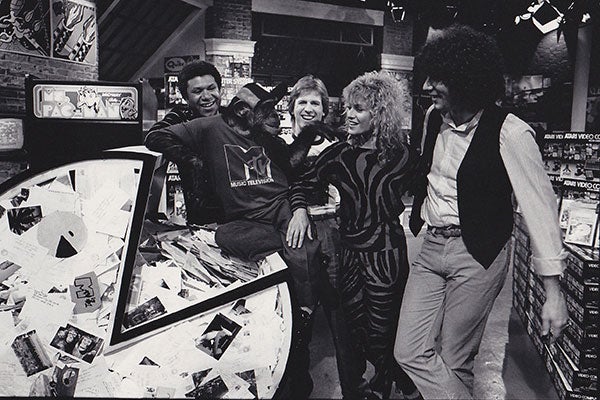Klein covers evolution of MTV in new book

The original MTV cast meet Zippy the Chimp.
When MTV launched in 1981 with “Video Killed the Radio Star” by the Buggles, it was billed as a 24-hour video jukebox, and the success of that format showed it was possible for a cable network to succeed by identifying and targeting a market niche.
MTV’s was Generation X, loosely defined as Americans born between 1965 and 1982, said Amanda Klein, associate professor of film studies at ECU. But beginning in the mid-1990s and for the next decade-and-a-half, Gen X began to age out. So MTV studied how to stay relevant with a new generation of youth: millennials.
By the early 2000s catching a music video on MTV was difficult, and in 2010 the network dropped the word “music” from its corporate logo and branding, an acknowledgement the youth market was the most important thing, not the music.
Klein’s new book, Millennials Killed the Video Star, published in February by Duke University Press, explores how MTV shifted its programming toward identity-based reality shows and what that shift says about the youth who became its new target audience.
“It’s always good to point out when you talk about generations and these kinds of labels that it’s not a real thing. It’s not like you’re born in this or that year so you’re fundamentally different from someone who was born (at a different time),” she said. “I’m impacted by my gender, my race, my social class, my education, but a factor in how I see the world and my touchstone for experiences is when I was born.

The cast of the MTV hit Teen Mom
“And so MTV is really interesting when talking about youth culture, because it’s a channel that’s about targeting youth.”
MTV’s experiment with reality television started in the early ’90s with The Real World.
“You start to see these different ways of talking about what identity is,” Klein said. “If you look at early seasons of The Real World, you see cast members who are starting to talk about what it means to be Black or what it means to be gay. But the white characters, especially in the early seasons, seem always a little confused. They don’t know what they are.
“And so you see in these later MTV series these opportunities for white kids to feel like they have an identity. You see that really strongly in shows like Jersey Shore and Buck Wild.”
Drawing on interviews with producers and actors from several of the shows, Klein concludes the programming helped shape how MTV’s mostly white audience viewed and discussed their own identities.
Klein has made several media appearances of her own, including on E! Entertainment’s series For Real: The Story of Reality TV, which premiered March 25.
